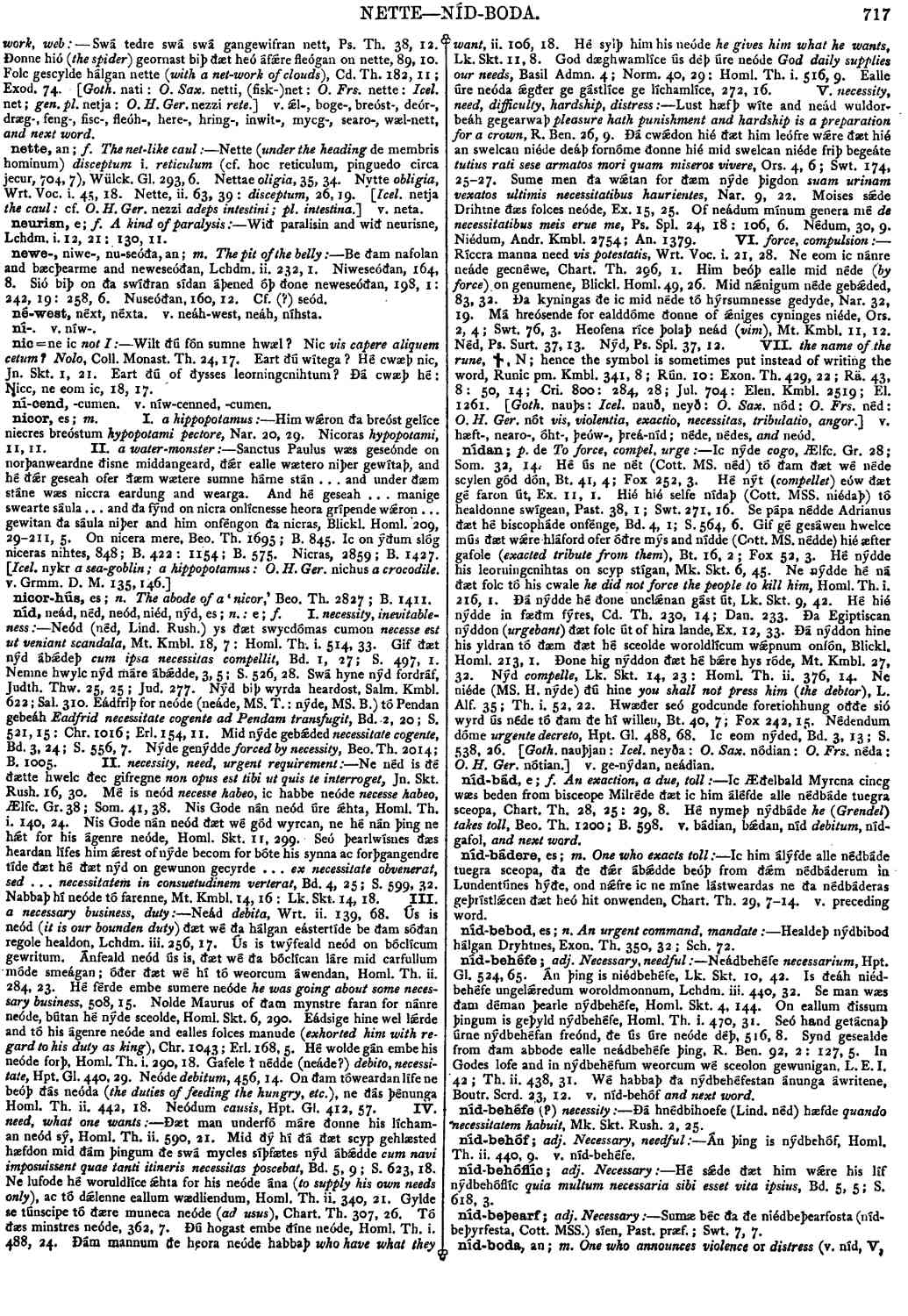níd
- noun [ feminineneuter ]
-
Neód (néd, Lind. Rush.) ys ðæt swycdómas cumon
necesse est ut veniant scandala,
- Mt. Kmbl. 18, 7 : Homl. Th. i. 514, 33.
-
Gif ðæt nýd ábǽdeþ
cum ipsa necessitas compellit,
- Bd. 1, 27 ;
- S. 497, 1.
-
Nemne hwylc nýd máre ábǽdde,
- 3, 5 ;
- S. 526, 28.
-
Swá hyne nýd fordráf,
- Judth. Thw. 25, 25 ;
- Jud. 277.
-
Nýd biþ wyrda heardost,
- Salm. Kmbl. 622 ;
- Sal. 310.
-
Eádfriþ for neóde (neáde, MS. T.: nýde, MS. B.) tó Pendan gebeáh
Eadfrid necessitate cogente ad Pendam transfugit,
- Bd. 2, 20 ;
- S. 521, 15 : Chr. 1016 ;
- Erl. 154, 11.
-
Mid nýde gebǽded
necessitate cogente,
- Bd. 3, 24 ;
- S. 556, 7.
-
Nýde genýdde
forced by necessity,
- Beo. Th. 2014 ;
- B. 1005.
-
Ne néd is ðé ðætte hwelc ðec gifregne
non opus est tibi ut quis te interroget,
- Jn. Skt. Rush. 16, 30.
-
Mé is neód
necesse habeo,
ic habbe neóde
necesse habeo,
- Ælfc. Gr. 38 ;
- Som. 41, 38.
-
Nis Gode nán neód úre ǽhta,
- Homl. Th. i. 140, 24.
-
Nis Gode nán neód ðæt wé gód wyrcan, ne hé nán þing ne hǽt for his ágenre neóde,
- Homl. Skt. 11, 299.
-
Seó þearlwísnes ðæs heardan lífes him ǽrest of nýde becom for bóte his synna ac forþgangendre tíde ðæt hé ðæt nýd on gewunon gecyrde ...
ex necessitate obvenerat, sed ... necessitatem in consuetudinem verterat,
- Bd. 4, 25 ;
- S. 599, 32,
-
Nabbaþ hí neóde tó farenne,
- Mt. Kmbl.14, 16 : Lk. Skt. 14, 18.
-
Neád
debita,
- Wrt. ii. 139, 68.
-
Ús is neód
( it is our bounden duty
)ðæt wé ða hálgan eástertíde be ðam sóðan regole healdon,
- Lchdm. iii. 256, 17.
-
Ús is twýfeald neód on bóclícum gewritum. Ánfeald neód ús is, ðæt wé ða bóclícan láre mid carfullum móde smeágan; óðer ðæt wé hí tó weorcum áwendan,
- Homl. Th. ii. 284, 23.
-
Hé férde embe sumere neóde
he was going about some necessary business,
- 508, 15.
-
Nolde Maurus of ðam mynstre faran for nánre neóde, bútan hé nýde sceolde,
- Homl. Skt. 6, 290.
-
Eádsige hine wel lǽrde and tó his ágenre neóde and ealles folces manude (
exhorted him with regard to his duty as king
),- Chr. 1043 ;
- Erl.168, 5.
-
Hé wolde gán embe his neóde forþ,
- Homl. Th. i. 290, 18.
-
Gafele ł nédde (neáde?)
debito, necessitate,
- Hpt. Gl. 440, 29.
-
Neóde
debitum,
- 456, 14.
-
On ðam tóweardan lífe ne beóþ ðás neóda (
the duties of feeding the hungry, etc.
),ne ðás þénunga
- Homl. Th. ii. 442, 18.
-
Neódum
causis,
- Hpt. Gl. 412, 57.
-
Ðæt man underfó máre ðonne his líchaman neód sý,
- Homl. Th. ii. 590, 21.
-
Mid ðý hí ðá ðæt scyp gehlæsted hæfdon mid ðám þingum ðe swá mycles síþfætes nýd ábǽdde
cum navi imposuissent quae tanti itineris necessitas poscebat,
- Bd. 5, 9 ;
- S. 623, 18.
-
Ne lufode hé woruldlíce ǽrehta for his neóde ána (
to supply his own needs only
),ac tó dǽlenne eallum wædliendum,
- Homl. Th. ii. 340, 21.
-
Gylde se túnscipe tó ðære muneca neóde (
ad usus
),- Chart. Th. 307, 26.
-
Tó ðæs minstres neóde,
- 362, 7.
-
Ðú hogast embe ðíne neóde,
- Homl. Th. i. 488, 24.
-
Ðám mannum ðe heora neóde habbaþ
who have what they want,
- ii. 106, 18.
-
Hé sylþ him his neóde
he gives him what he wants,
- Lk. Skt. 11, 8.
-
God dæghwamlíce ús déþ úre neóde
God daily supplies our needs,
- Basil Admn. 4 ;
- Norm. 40, 29 : Homl. Th. i. 516, 9.
-
Ealle úre neóda ǽgðer ge gástlíce ge líchamlíce,
- 272, 16.
-
Lust hæfþ wíte and neád wuldor-beáh gegearwaþ
pleasure hath punishment and hardship is a preparation for a crown,
- R. Ben. 26, 9.
-
Ðá cwǽdon hié ðæt him leófre wǽre ðæt hié an swelcan niéde ðeáþ fornóme ðonne hié mid swelcan niéde friþ begeáte
tutius rati sese armatos mori quam miseros vivere,
- Ors. 4, 6 ;
- Swt. 174, 25-27 ,
-
Sume men ða wǽtan for ðæm nýde þigdon
suam urinam vexatos ultimis necessitatibus haurientes,
- Nar. 9, 22.
-
Moises sǽde Drihtne ðæs folces neóde,
- Ex. 15, 25.
-
Of neádum mínum genera mé
de necessitatibus meis erue me,
- Ps. Spl. 24, 18 : 106, 6.
-
Nédum,
- 30, 9.
-
Niédum,
- Andr. Kmbl. 2754 ;
- An. 1379.
-
Ríccra manna need
vis potestatis,
- Wrt. Voc. i. 21, 28.
-
Ne eom ic nánre neáde gecnéwe,
- Chart. Th. 296, 1.
-
Him beóþ ealle mid néde (
by force
),on genumene,
- Blickl. Homl. 49, 26.
-
Mid nǽnigum néde gebǽded,
- 83, 32.
-
Ða kyningas ðe ic mid néde tó hýrsumnesse gedyde,
- Nar. 32, 19.
-
Má hreósende for ealddóme ðonne of ǽniges cyninges niéde,
- Ors. 2, 4 ;
- Swt, 76, 3.
-
Heofena ríce þolaþ neád (
vim
),- Mt. Kmbl. 11, 12.
-
Néd,
- Ps. Surt. 37, 13.
-
Nýd,
- Ps. Spl. 37, 12.
- Runic pm. Kmbl. 341, 8 ;
- Rún. 10 : Exon. Th. 429, 22 ;
- Rä. 43, 8 : 50, 14 ;
- Cri. 800 : 284, 28 ;
- Jul. 704 : Elen. Kmbl. 2519 ;
- El. 1261.
Bosworth, Joseph. “níd.” In An Anglo-Saxon Dictionary Online, edited by Thomas Northcote Toller, Christ Sean, and Ondřej Tichy. Prague: Faculty of Arts, Charles University, 2014. https://bosworthtoller.com/23624.
Checked: 1